OUR PROGRAMMES
- Conservation Research and Biomonitoring
- Designing Strategies & Conservation Models
- Establishing Protected Areas and PA Management
- Conservation Education & Outreach
- Stakeholder Engagement
- Community Support and Sustainable Livelihood Practice
- Training and Capacity Building
- Species-focused conservation intervention
- Habitat Restoration and Reforestation
- Driving Public Participation through Media
- Ecotourism Development
- Policy Advocacy
SPECIES-BASED CONSERVATION
Our conservation efforts are centered on two important and vulnerable populations of endemic and near-endemic species.
1. The Niger Delta red colobus, which is found exclusively in Bayelsa State in the Niger Delta.
2. The chimpanzee populations in southwestern Nigeria, which are biologically unique and closely related to the Nigerian-Cameroon subspecies.
Despite their ecological and biological significance, these populations were largely unprotected and highly vulnerable to extinction prior to our interventions, particularly due to widespread habitat loss in both sites where the last significant populations can still be found. The accelerated rate of deforestation contributed significantly to this threat. Our conservation initiatives have led to establishing and managing new protected areas within the Ise Forest and the Apoi community forest. These efforts have enabled us to preserve the remaining populations of these focal species and protect critical habitats for other species, such as pangolins, West African crocodile, grey parrot, the Benin potto, Nigerian white-throated monkeys, red-capped mangabeys, Nigerian putty-nosed monkeys etc.
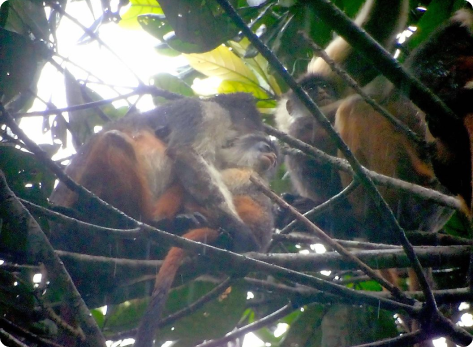
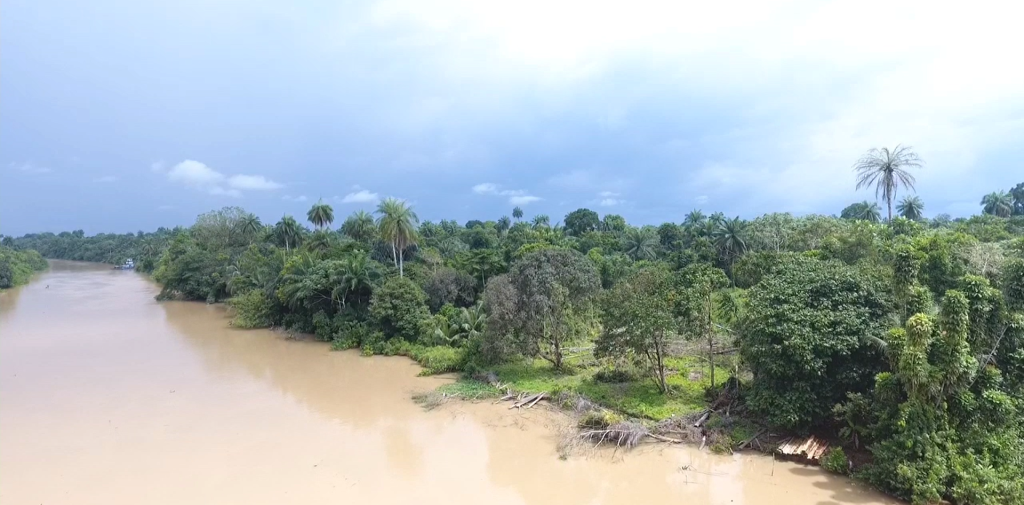
LANDSCAPE -LEVEL CONSERVATION INTERVENTION
The Niger Delta red colobus monkey’s population doubling in just four years is an inspiring success story. It demonstrates that even highly vulnerable species can recover from near extinction with concerted habitat protection and management efforts. This triumph bolsters our resolve to preserve the Niger Delta’s biodiversity for future generations. Our ongoing initiatives are pivotal for the Niger River Delta landscape’s sustainable conservation, benefiting local communities and governments at all levels in Nigeria, and setting a worldwide precedent for environmental stewardship. Our ultimate aim is to rehabilitate the Niger River Delta ecosystem, including its swamp forests, mangroves, coral reefs, and ocean, by bringing 500,000 hectares under active conservation management. The conservation of the Niger River Delta landscape is an immense undertaking, necessitating a comprehensive strategy that encompasses scientific research, community involvement, and government support. This region is notable for its expansive swamp forests, covering 15,000 km²—the second-largest in Africa—and its vast mangrove expanse of 36,000 km², the third-largest contiguous mangrove globally. Since 2021, we have successfully established four IUCN category II and IV protected areas, which are being managed effectively. Building on this accomplishment, we are currently negotiating three new sites. Out of these seven proposed sites, six are being developed through a conservation partnership with local communities in the Niger Delta. This includes a consortium of thirteen local communities and a coastal community, which will lead to the establishment of Nigeria’s first-ever marine protected area.
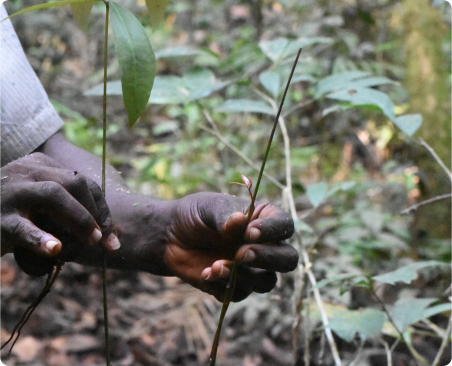
HABITAT MANAGEMENT (REFORESTATION, ASSISTED NATURAL REGENERATION ETC.)
Our reforestation efforts involves planting trees in deforested areas, which helps restore the ecosystem which we combine with Assisted natural regeneration (ANR), that encourages the natural growth of forests by protecting and managing the existing vegetation. Protection task is carried out by a teams of trained community rangers in all of our sites supported by trained PA managers. We also have farmer-managed natural regeneration through our famers field school program where we train farmers in agro-forestry and distribute tree seedlings through a working partnership. This way the buffer zones of the protected areas we manage provide habitat corridors for wildlife populations. These habitat management practices play a pivotal role in habitat restoration, resilience against climate change, preserve watershed, and secure other elements of biodiversity.
The journey towards a greener future in these regions requires collaboration between local communities, government agencies, and international organizations. It is a collective effort that promises not only ecological benefits but also socio-economic improvements, contributing to the overall well-being of the population. These provide proof of the nature-based solutions our organization provide.
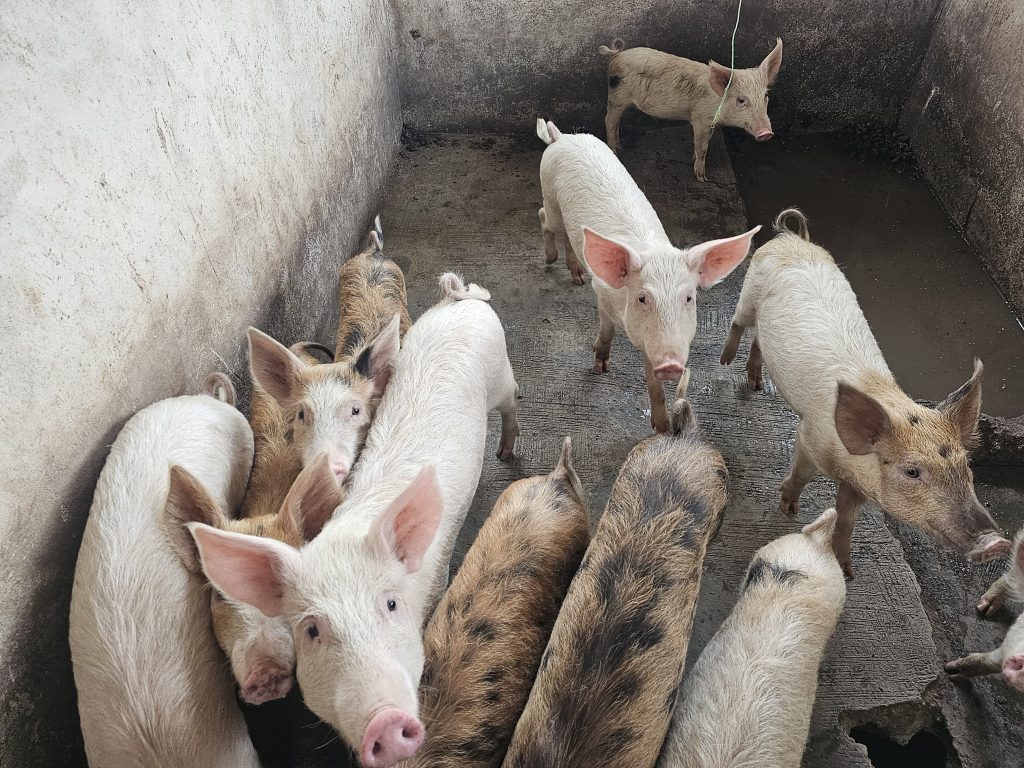
ANIMAL HUSBAN-TREES (SOCIAL ENTERPRISE) INITIATIVE
Animal Husban-tree was envisioned as a social enterprise initiative that merges tree planting with alternative livelihood in livestock production. The business model aims to empower local communities in our project sites to become entrepreneurs who are conservation-minded.
The socio-economic effects of the COVID-19 pandemic prompted us to expand our approach in 2021 to provide a livelihood option, ensuring the development of a sustainable impact model over time that also enhances the protection and management of the areas we oversee. This model employs a three-pronged strategy: first, it creates a viable income source for those affected by the establishment of the conservation area (and by COVID-19), offering them an alternative income stream. Second, it allows them to use livestock as a substitute for meat, replacing bushmeat-based protein diets. Third, beneficiaries were matched with another group of participants responsible for tree planting, from seed collection and nursery so as to propagate native ‘food’ trees for the project’s target species especially forest-dependent, specialist such as the red colobus monkey.
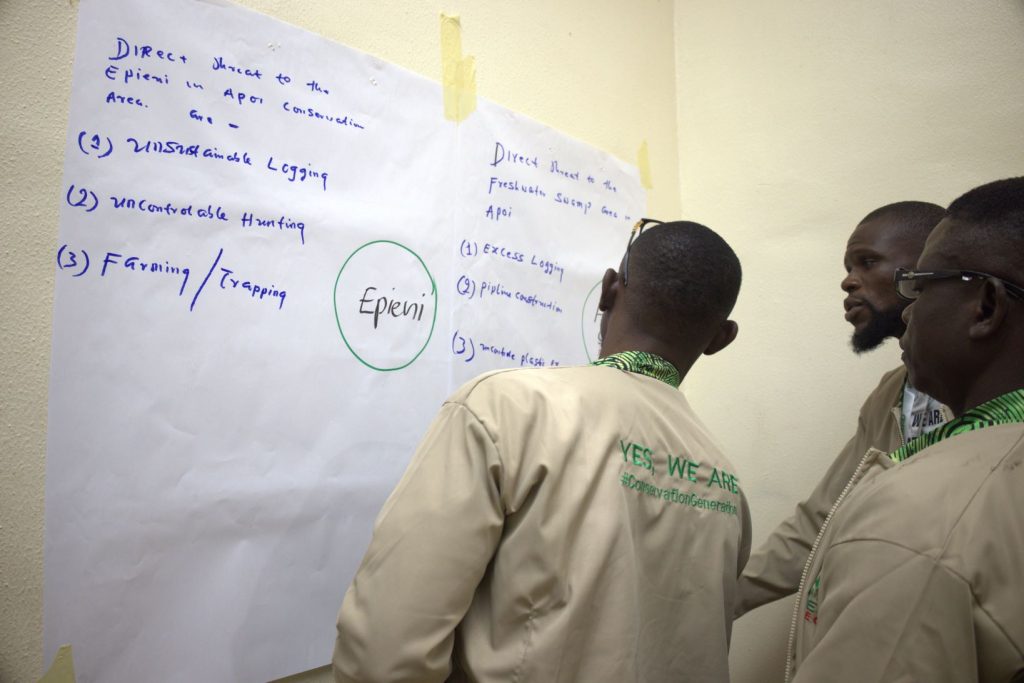
BUILDING LOCAL AND INSTITUTIONAL CAPACITIES IN CONSERVATION
Effective conservation efforts require the development of individual-level, community-level and institutional capacities.
Our conservation programmes involve an active component in capacity building which is resulting in transformational impacts on participants’ practices and professional trajectories. Building capacity involves more than just training; it includes applied experiences, immersion into the practice of conservation management, and forest governance.
Also, conservation leadership, strategic planning, decision-making, governance, fundraising, monitoring, and evaluation are key areas that we have ensured capacity development especially in local communities. Local, State-level and national governments also need to strengthen their institutional capacity for sustained conservation impact.
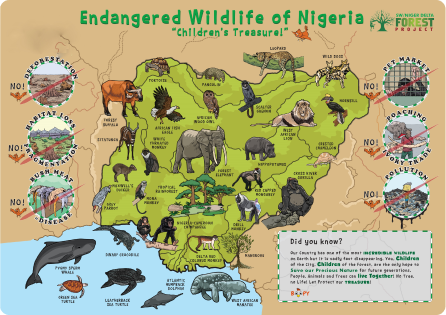
CURATING PRACTICAL LEARNING EXPERIENCE IN CONSERVATION AND EQUIPPING A YOUNGER GENERATION OF CONSERVATION STEWARDS
Our Science on-the-Ground Initiative is a transformative program aimed at fostering scientific knowledge and environmental stewardship among the youth in Nigeria. By bringing training and mentorship directly to educational institutions, the initiative seeks to empower students (ages 13 – 25) with the skills and insights needed to tackle environmental challenges. The program’s objectives include enhancing research capabilities, promoting conservation education, and inspiring a new generation of policy advocates. This aligns with the organization’s broader mission of protecting wildlife and ecosystems, as evidenced by our successful conservation projects and community-based initiatives. Through this initiative, SW/Niger Delta is not only investing in the immediate educational needs but also in the long-term sustainability of Nigeria’s rich natural heritage. Some specific activities within this programme are:
- Develop interactive and engaging conservation training that focus on the unique biodiversity of Nigeria.
- Promote the integration of ecological knowledge and conservation practices into the learning curriculum.
- Create online platforms for knowledge sharing and networking among Nigerian youth interested in conservation.
- Utilize digital tools and social media to raise awareness and inspire conservation action among the youth.
- Offer grants for new projects and internships to encourage expansion of conservation-related projects.
- Organize conservation challenges and competitions to foster innovation and problem-solving skills.
- Support youth-led conservation projects and initiatives to empower ownership and responsibility.
- Facilitate mentorship programs linking young people to existing projects within our organization to boost hands-on field experience.
- Ensure the learning experience is accessible to all, regardless of socioeconomic background or academic discipline.